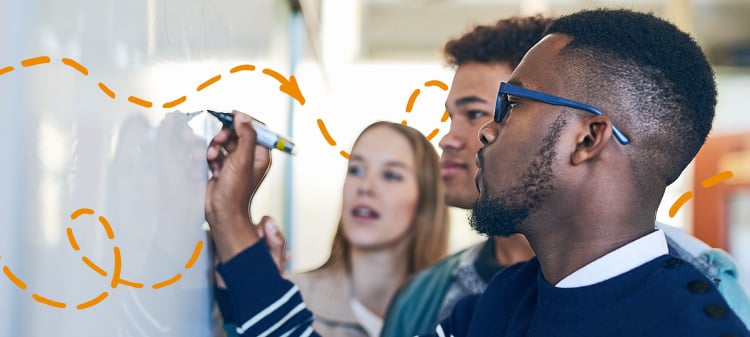What Is Interprofessional Education?
What is IPE?
In today's world of specialized care, improving outcomes for patients and students requires collaboration. We must work together with professionals in other disciplines—as well as families and caregivers. Interprofessional practice (IPP) is a framework that makes this collaboration more successful, and interprofessional education (IPE) helps students and professionals develop the skills needed to work on these interprofessional teams.
ASHA has embraced the World Health Organization’s (WHO, 2010) definitions of IPE and IPP and adapted them to reflect that audiologists and speech-language pathologists provide services in both health care and education settings.
IPE is an activity where two or more professions learn about, from, and with each other to enable effective collaboration and improve health and education outcomes.
IPP is said to occur when multiple health workers from different professional backgrounds provide comprehensive health services and educational services by working with individuals, their families, caregivers, and communities to deliver the highest quality of care across settings.
Both aspiring and practicing audiologists and speech-language pathologists (SLPs) must be prepared to collaborate on teams with colleagues from other disciplines and across settings. Interprofessional education (IPE) means that students and professionals are learning about, from, and with others from different disciplines. This is a vital part of preparing aspiring and existing audiologists and SLPs to work in any setting.
Interprofessional Education: Moving From More IPE to Better IPE
In this webinar, Dr. Jennifer B. Watson from Texas Christian University, explores the importance of IPE in building effective teams. Emphasizing the need for better IPE, Dr. Watson shares strategies for integrating collaborative approaches.
In this brief interview, Dr. Elena M. Umland, PharmD, co-director of the Jefferson Center for InterProfessional Education (JCIPE) and associate dean for Academic Affairs at Thomas Jefferson University, describes what IPE is, why it is important and how it is unique from how we have historically collaborated with other professions.
In pre-professional programs, IPE curricula teach students why interprofessional collaboration is important and help students understand the skills, strengths, and expertise that each person brings to service delivery. By learning together with students from other disciplines, IPE helps future audiologists and SLPs cultivate an awareness and respect for other professions. It also discourages students from developing prejudices and rivalries with other professions or practicing in clinical silos. By introducing IPP in the classroom and in authentic practice settings with real-world teams, students can prepare for professional practice by working in small interprofessional groups through planned activities in a supported learning environment.
ASHA's resource on how to plan an IPE learning experience provides step-by-step guidance on infusing IPE into health professions education curricula and professional development. This recorded presentation (see the slides in PDF) features IPE at Thomas Jefferson University and a case study [PDF] exercise implemented with audiology students.
IPE isn’t limited to college and graduate programs, though. Practicing clinicians working in health care or schools will likely encounter IPE as part of their professional development. In fact, according to the 1,797 practicing audiologists and SLPs who responded to ASHA’s 2023 Interprofessional Practice Survey, only one-third (36.5%) had not received training on IPP. Additionally, 88.1% report acquiring their IPP knowledge and skills on the job. This means that on-the-job training plays a major role in ensuring that audiologists and SLPs have the skills needed to work on interprofessional teams.

Just like pre-professional programs, IPE helps practicing audiologists and SLPs understand the value and knowledge that their colleagues can share. On the flip side, IPE gives practicing audiologists and SLPs a chance to educate others about the value that they can bring to an IPP team.
For More Information
Read more about advocating for yourself on an IPP team. Also, see the following case studies to understand IPE in action.
Case Study: Students Receive Valuable IPP Training During a Disaster Simulation Event
To help students learn collaboration skills, university faculty staged an interdisciplinary IPE simulation of a tornado. The experience allowed students to practice collaborating and executing their roles during the exercise.
Case Study: International Team Gives Caregiver Education in Democratic Republic of the Congo
A team of medical professionals visiting from the United States worked with staff at an outpatient rehabilitation clinic in the Democratic Republic of the Congo to model IPP and IPE collaboration. In this case study, the whole team worked together to create an assessment and treatment plan for a 6-year-old boy with a complaint of severely reduced expressive language. They also provided education and strategies to the boy’s mother.
Past ASHA Convention Session on IPE
In 2012, Towson University created the Institute for Well-Being to facilitate IPE for students across the health professions. Students engage in numerous community outreach experiences involving IPE. This session from the 2016 ASHA Convention focuses on the challenges and solutions for making IPE work across multiple departments and majors.
Developed over 3 years at the Touro College School of Health Sciences in conjunction with the master’s program in speech-language pathology, the program utilizes simulated IPE case management, faculty training, and curricular integration. This session was presented at the 2016 ASHA Convention. See the slides [PDF].













